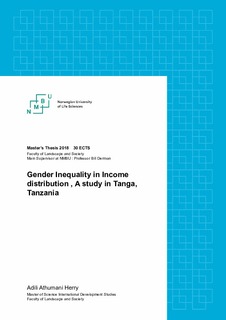| dc.description.abstract | This study was conducted in the city of Tanga, Tanzania in January 2018. The main purpose was to examine effects of gender inequality to the standards of living of women in Tanga, Tanzania. In this area of gender inequality, the study focuses on income inequality between men and women. Income inequality is examined by looking at women opportunities and challenges they face in their economic lives. The study uses life experiences of these women to determine gender inequality tendencies between men and women in the Tanga society and how they manifest in the lives of women.
The study further explores on how gender inequality plays a role to determine types of occupations that women engage with. The life experiences of these women help to learn more about social, economic and political organization in Tanga’s society.
This study used both primary and secondary data to look at gender inequality effects on income distribution within the society.
Qualitative research design with interviews and observations conducted as major data collection techniques, was used to learn more about the lives of these women. The study uses different approaches, theories and concepts, including human development and capability approach and phenomenology to get the broader picture of issues that are embedded in the daily lives of these women.
The study findings show gender inequality tendencies are widespread in Tanga, Tanzania and play a role to limit women opportunities to access income. Gender inequality shapes the distribution of income within the society in Tanga with men getting the lion share. The feedback I received from women in Tanga, Tanzania when I spoke to them about their access to income, indicates that they have limited chances and opportunities to access income and to live a better life compared to men. Their chances and opportunities to get quality education, decent and high paying jobs, ownership and inheritance of material resources and leadership positions are very minimal due to gender inequality which is embedded in the culture of their society. As part of the society that is dichotomic and hierarchical in nature, with men getting more attention, priorities and privileges in the social, political and material life of the society, these women find themselves pushed and fall within the margins of their society because of low social status, lack of decision making power, low level of education and lack of ownership of material resources. | nb_NO |

